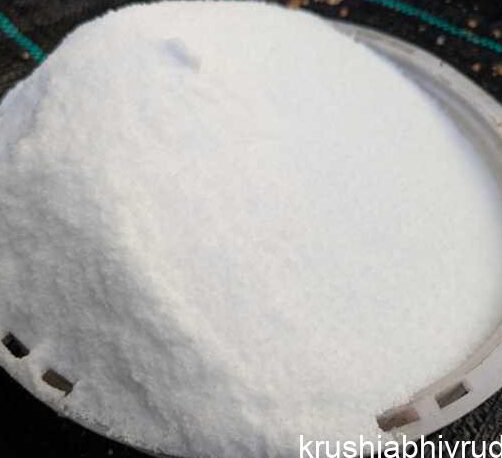Mono- Potassium Phosphate (MKP), or 0:52:34, chemically known as KH₂PO₄, is a highly efficient, water-soluble fertilizer that plays a special role in plant health. It is safe for humans and plants. Its pH is moderate.
It serves as a concentrated source of two major plant nutrients — phosphorus (P) and potassium (K). With a typical nutrient composition of 52% phosphorus and 34% potassium, MKP is a chloride-free compound that promotes balanced plant nutrition. Its application greatly influences plant growth, especially in fruit and flower crops, by enhancing root development, inducing flowering, improving disease resistance, and aiding in fruit setting.
Root Growth Enhancement:

One of the foundational benefits of Mono-Potassium Phosphate in plant health is its ability to stimulate vigorous root development. Phosphorus, a primary component of MKP, is essential during the early growth stages of crops. It supports cell division, energy transfer, and root elongation. When applied at the early vegetative stage, MKP promotes a deep and well-branched root system, which is vital for nutrient and water uptake. Strong roots not only anchor the plant but also build a foundation for sustainable growth and productivity throughout the crop cycle.
In horticultural crops like tomatoes, grapes, and citrus, the use of mono-potassium phosphate during transplanting or early growth stages results in faster establishment and better tolerance to environmental stress. A healthy root system also improves the plant’s ability to absorb micronutrients from the soil, leading to more balanced overall growth.
Flower Inducement:
Mono-Potassium Phosphate, is widely used as a flowering stimulant in fruit and ornamental crops. The phosphorus content encourages the transition from vegetative to reproductive phases, promoting the initiation of flower buds. Simultaneously, potassium strengthens the flower stalks and helps in the transport of carbohydrates, ensuring the energy required for proper flower development.
In crops such as mango, pomegranate, and guava, foliar application of mono-potassium phosphate before flowering season has shown a significant increase in the number of flowers and flower uniformity. The application also helps in synchronizing the flowering process, which is particularly valuable in commercial orchards to ensure a uniform harvest.

Disease Resistance:
Beyond growth and development, it plays a protective role in enhancing plant defense mechanisms. Potassium, the second major nutrient in MKP, regulates many physiological processes, including water balance and enzyme activation. It helps thicken cell walls, making it harder for pathogens to invade. Phosphorus also contributes to plant immunity by aiding in energy storage and transfer, which supports the production of disease-resisting compounds.
Numerous studies in horticultural crops have shown that MKP application can reduce the incidence of fungal and bacterial diseases. For example, in grapes, foliar MKP sprays during the growing season can help reduce downy mildew and powdery mildew infestations, reducing the need for chemical fungicides and promoting cleaner, residue-free produce.
Fruit Setting and Development:
MKP significantly improves fruit setting and overall fruit quality. After successful flowering, phosphorus and potassium continue to support the plant by ensuring proper pollination, fertilization, and embryo development. Potassium enhances sugar translocation and water regulation in fruiting tissues, resulting in better fruit size, color, taste, and shelf-life.
In fruit crops like banana, apple, and papaya, MKP ensures uniform fruit setting and reduces premature fruit drop. It also improves the fruit’s resistance to cracking and other physiological disorders. Regular use of MKP in fertigation or foliar feeding schedules supports high yields and marketable quality, essential for commercial growers.
Conclusion
Mono Potassium Phosphate is a versatile and essential input in modern horticulture. Its balanced composition of phosphorus and potassium makes it ideal for promoting root growth, initiating flowering, boosting disease resistance, and improving fruit setting and quality. Whether applied through drip irrigation, soil drenching, or foliar spraying, MKP has proven benefits that contribute to healthier plants and higher yields. As sustainable farming practices gain more importance, MKP stands out as a reliable and efficient solution for maintaining robust plant health in horticultural crops









